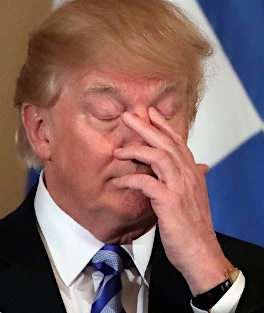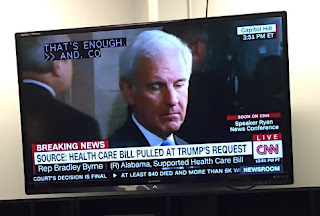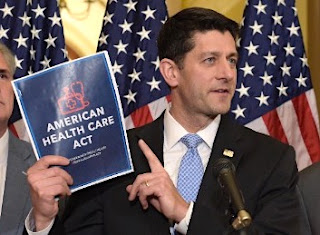‘Rookie error’: The disaster of TrumpCare, the president
who branded it, and the House Speaker who birthed it
We will immediately repeal and replace ObamaCare — and nobody can do that like me. We will save $'s and have much better healthcare!
@realDonaldTrump, February 2016
YOU KNOW it’s been a bad day at House Trump when the proprietor in chief won’t even tweet about the biggest accomplishment of the day. The one that was intended to be held high as a shining example of presumptive president Donald Trump’s ability to lead a newly-unified Republican government. But there was silence about that biggest accomplishment from TeamTrumpTweet ... which makes a kind of sense: When the biggest accomplishment didn’t come off as planned, well, who wants to own up to that?
On the day after the seventh anniversary of the Affordable Care Act, President Obama’s bedrock-legacy domestic achievement, Trump caved on even bringing the ACA’s long-awaited replacement to the floor of the House of Representatives for a vote.
On Friday, in an act of political euthanasia — one that everyday people can understand better than the politicians — the American Health Care Act was withdrawn shortly before an almost-certain losing vote in the House, despite the late-night pleading of Trump administration officials with Republican conservatives who refused to sign on. The bill shorthanded AHCA was quickly and mercifully taken off the respirator by its loved ones, rather than be allowed to die over time, vote by vote, on live television.
If that seems like a harsh rhetorical use of real-life experiences, all apologies. But the fact of how the AHCA went down to defeat implicitly sends that same message: This is how precipitous American lives are down here on the ground, in the real world. “Repeal and replace” was simply not an option, not for Americans who’ve besieged their representatives in emails and tweets, phone calls and town halls for weeks.
“We had no votes from the Democrats,” Trump said on Friday afternoon. “They weren’t going to give us a single vote, so it’s a very difficult thing to do … I think what will happen is Obamacare, unfortunately, will explode. It’s going to have a bad year.”
◊ ◊ ◊
YOU COULD see this coming from a distance. The AHCA never had the populist loft needed to take off. It was rushed, hurried. Obamacare took about a year to gain ground in Congress and gain favor with the public. Trump’s legislation — principally the work of House Speaker Paul Ryan — took less than two months. It didn’t pass the smell test with anyone.
Influential conservative entities from the Heritage Foundation to the Club for Growth hammered Trump’s AHCA mercilessly in the week before the vote. “In many ways, the House Republican proposal released last night not only accepts the flawed progressive premises of Obamacare but expands on them,” Heritage Action CEO Michael A. Needham said to The Daily Beast on March 14. Others piled on with no fear of retribution.
It was going south for House Trump. We knew it Thursday when White House Press Secretary Sean Spicer said “we are very, very pleased with the direction this is going.” With a straight face. We knew it when Ryan postponed a planned Thursday vote, pushing it back later in the day and finally cancelling it.
We knew it late Wednesday, when the president-apparent, a big fan of brinkmanship, said he wanted Congress to get behind the AHCA or he would abandon the repeal-and-replace effort altogether.
◊ ◊ ◊
The arm-twisting and gnashing of teeth continued into the night but by Friday morning, not enough had changed. Trump, sensing an all-in, guts-ball moment in the making, dramatically called for a floor vote on Friday. No dice. It wasn’t cooler heads that prevailed, it was mathematics.
The Democrats were a solid bloc against the AHCA. Any more than 22 House Republicans voting against the Trump measure was a kiss of death, and there were a lot more No votes than that. The White House knew it; Trump, consulting with Ryan, the author of this nightmare, opted to, uh, pull the plug.
“I spoke to the president just a little while ago and I told him that the best thing I think to do is to pull this bill, and he agreed with that decision,” Ryan said at a press conference. “This is a setback—no two ways about it. "We're going to be living with Obamacare for the foreseeable future.”
◊ ◊ ◊
HOUSE MINORITY Leader Nancy Pelosi pulled no punches when the deal went down, with a timeless quote: “Rookie error, Donald Trump, for bringing this up on a day that it is clearly not ready,” the California Democrat said. “You do not bring up your bill just to be spiteful on the anniversary of the Affordable Care Act. You build consensus ... not the shortest, quickest monstrosity you can bring to the House floor.”
There’s a semantic reason for Democrats to cheer: By characterizing the GOP replacement measure as “Obamacare Lite,” as Kentucky Sen. Rand Paul did on March 14 (when TrumpCare was still gathering what looked like steam), Republicans attached to their own legislation a weaker contrasting rhetorical valance that defined it, fatally.
By definition, if you say something is “[Anyword] Lite,” you’ve invested the [Anyword] with a weight that its ostensible alternative doesn’t have. The intended Republican disparagement is an actual Republican compliment. The messaging itself sent the signal that the Republicans knew AHCA was facing an uphill battle.
◊ ◊ ◊
TOM PRICE’S bid for the diplomacy of gradualism had its own unexpected revelation. On March 14, the Health and Human Services secretary told reporters the AHCA is a “is a work in progress, and we'll work with the House and the Senate. As you know, it's a legislative process that occurs. ... People engage and they get involved in the process. Sometimes, to a greater degree, nothing focuses the mind like a bill currently sitting on the table. We’ll work through it.”
With his “work in progress” talk, Price underscored something that was just as true for the GOP replacement for Obamacare as it’s true of the genuine article. Obamacare was never intended as the be-all and end-all, the slam dunk for all the nation’s health-care woes.
From the start, seven years ago this month, President Obama characterized it as a first step, not an event but a work in progress. Price’s comments on March 14th on behalf of the GOP’s alternative plan showed how challenging that process can be. No matter what side of the aisle you’re on.
Friday’s events were an optical and a tactical setback for Trump. By failing to even get the AHCA bill to the House floor for a vote, Trump saw his vaunted reputation as king of “the art of the deal” get the drubbing it deserved. It’s especially galling since last Oct. 24, at a campaign rally, Trump all but guaranteed that a full-on repeal and replacement of Obamacare would be done and dusted within his first 100 days. He only needed 64 to find out how wrong he was.
◊ ◊ ◊
But it shouldn’t have been that big of a surprise. Trump’s bill — which according to the Congressional Budget Office would leave 24 million more Americans without insurance in 2024 — faced big challenges from the jump. Starting with the public. A March 14th Survey Monkey poll found that “the Republican replacement bill starts out under water, with far more opposition (55 percent) than support (42 percent), and with twice as many Americans saying they are strongly opposed (38 percent) than strongly supportive (18 percent).”
A March 15th PPP poll found that almost twice as many Americans prefer Obamacare over the American Health Care Act. “Only 24% of voters support it, to 49% who are opposed. Even among Republican voters only 37% are in favor of the proposal to 22% who are against it, and 41% who aren't sure one way or another,” PPP reported. Small business owners feel much the same way.
Trump overplayed his hand, badly, with the Congress he needs to function. Maybe he was angry or just fed up with people resisting his every commandment — which tends to happen from time to time in popularly decided democratic governments. Whatever it was, it showed when Trump, late Wednesday, said he wanted Congress to fall in line or else he’d leave Obamacare in place.
It was an unwise gambit, maybe even flat-out stupid. It revealed Trump as the kind of negotiator who doesn’t negotiate, the kid who’ll take his ball and go home if he doesn’t get exactly what he wants. It was a gun held to the heads of political professionals by a rank amateur in the game. No doubt members of the House Freedom Caucus — already opposed to AHCA on the merits for not doing more to cut insurance costs and curb federal controls of insurance products — were further incensed by the freshman president, an orange popinjay trying to dictate terms to a Congress whose key players he scarcely knows.
◊ ◊ ◊
AND TRUMP faced problems, distilled in the dustup with the House Freedom Caucus, that stemmed directly from a mistaken idea of who and what he is today, and how difficult it’s been for him to navigate the difference between campaigning and governing.
“This will hopefully be a learning moment for President Trump, especially when you look ahead at other big issues like tax reform, the debt ceiling and infrastructure,” said Brian Walsh, a longtime Republican operative, to The Huffington Post.
Walsh said: “There’s a small group of Republicans who really have no concept of what it means to govern, and so, instead of trying to reason, cajole or capitulate with them, which was done to varying degrees over health care, the president needs to confront them head on. He needs to use the power of his platform to publicly call them out ...”
◊ ◊ ◊
Let’s break that substantial nugget down, piece by piece. When Walsh describes the House Freedom Caucus as “a small group of Republicans who really have no concept of what it means to govern,” he’s also talking about Trump and his core group of advisers in the administration. Donald Trump made it a cornerstone — the cornerstone — of his campaign that his administration would be a panoramic demonstration of his willingness to govern as a deliberate outsider, a president not beholden to the denizens of “the swamp” of Washington.
Now he’s the lifeguard of the swamp. Now he’s the ultimate insider, regardless of what he thinks, and he’s just discovered the force and rage of the outsiders he has to deal with.
“[A]nd so, instead of trying to reason, cajole or capitulate with them,” Walsh said, “the president needs to confront them head on. He needs to use the power of his platform to publicly call them out ...”
In short, Trump needs to be to some in his own party what President Obama was to all of the Republicans, during the first-term run-up to Obamacare — when Obama fought with the opposition on health care tooth and nail. The problem for Trump is obvious: a conflict that should be happening between Republicans and Democrats is happening within the Republican party.
◊ ◊ ◊
AND HE can’t “call them out” because he has no standing with these largely rural movement conservatives. With no inclination to learn the nuts and bolts of the system he’s inherited, with few organic allies in the Congress he needs — oh, Republicans will sign on to the president’s agenda and cheerlead, but many are holding their noses when they do, especially now — Trump so far doesn’t have the gravitas in Washington, in any legislative capacity, to bend this presumably unified Congress to his will.
Pelosi’s priceless “rookie error” quote deserves to resonate as the meme it will become: When Trump tried a my-way-or-the-highway move to get his way on the AHCA, he whiffed at the plate — forced to pull the bill before it even got to the floor of the House; forced to sit in the Oval Office muttering into the phone to Robert Costa of The Washington Post, telling Costa that “we just pulled it,” telling him what he and everyone watching this operatic debacle for the last week already knew.
The intricate avionics of politics, the hard work of getting legislation off the ground, has so far escaped Donald Trump, and odds are he’ll never get the hang of it. He has no sense of how to fly; and the health-care bill that just went down in flames was a sad attempt at building a plane and flying it at the same time.
◊ ◊ ◊
THE DONALD has other problems that contributed to this ... disaster. With job approval poll numbers as low as or lower than any for a president in the modern era, Trump was hardly in a position of negotiating leverage on AHCA. The public’s not behind him, and one poll, the reliable Quinnipiac poll, finds that his white male core of support is giving Trump the side-eye too.
Add the collateral damage of more investigations of Trump’s relationship with Russian oligarchs and the Kremlin in the run-up to the November election Moscow had a hand in corrupting ... and it’s clear Trump wasn’t exactly holding a strong populist hand when the AHCA was ready to roll out.
The Republicans spent weeks anticipating repealing and replacing Obamacare, salivating for it, yelling “Damn the torpedoes!” every chance they got. Then, when crunch time came, what happened? The Republicans torpedoed their own legislation before it came up for a vote.
◊ ◊ ◊
Now, the man who bludgeoned his opponents without mercy for 18 months en route to the White House faces a comeuppance from the people who were part of his gang, back in the day. Trump’s opponents within the Republican Party have more recently learned something they won’t forget.
Neither will the Democrats, who, with the defeat of AHCA, have found a grassroots leverage issue that could affect the congressional arithmetic in 2018.
They’ve all learned a schoolyard lesson, one that Walsh expressed plain as day to The Huffington Post: “[T]he only way to beat a bully is to punch them in the mouth.”
Image credits: Trump top: Carlos Barria/Reuters. Ryan: CNN. Pelosi (with Steny Hoyer): Chip Somodevilla/Getty Images. Obama 2010: MSNBC. PPP logo: © 2017 Public Policy Polling. Obamacare-AHCA days spent comparison chart: Mother Jones. Trump job approval chart: © 2017 Quinnipiac University. Trump bottom: via The Huffington Post.













.jpg)
Comments
Post a Comment